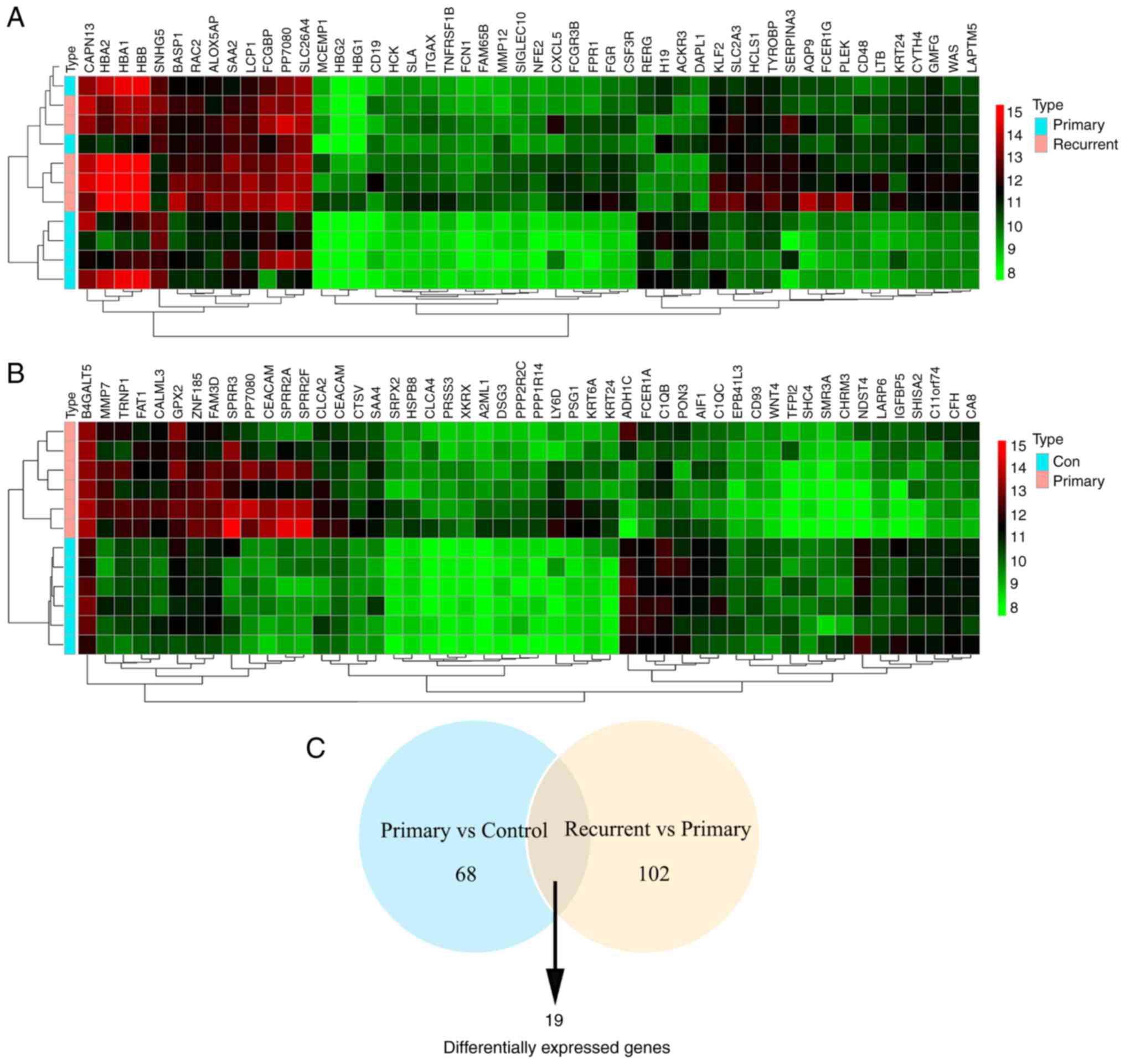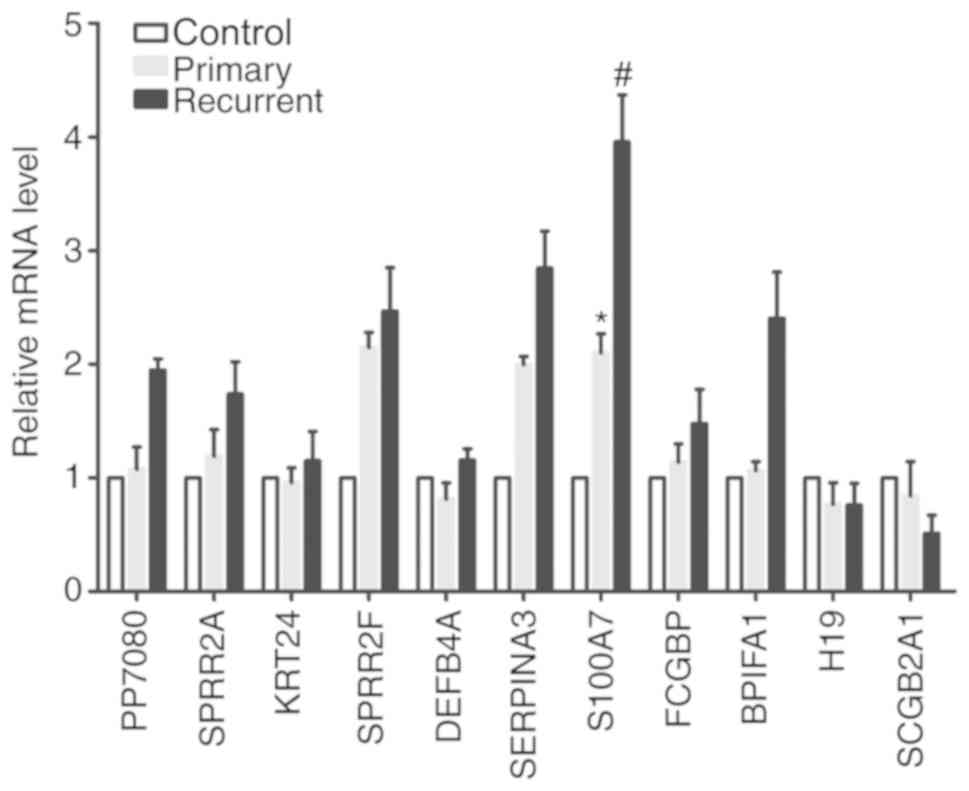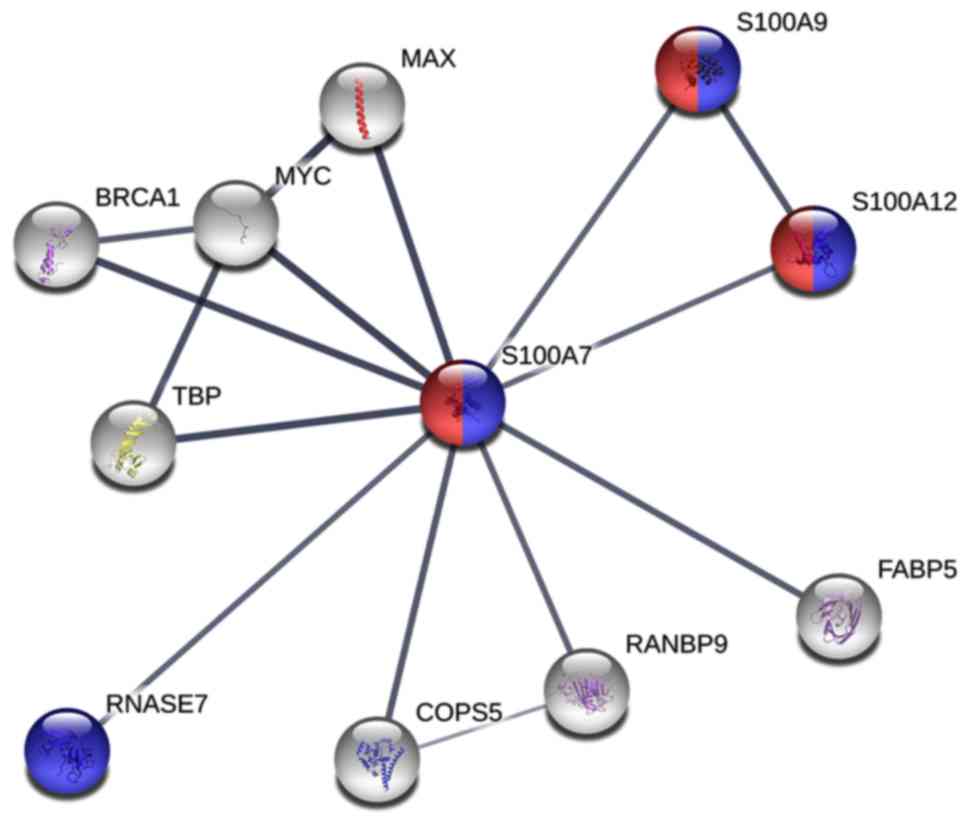|
1
|
Liu T, Liu Y, Xie L, He X and Bai J:
Progress in the pathogenesis of pterygium. Curr Eye Res.
38:1191–1197. 2013. View Article : Google Scholar : PubMed/NCBI
|
|
2
|
Monden Y, Hotokezaka F and Yamakawa R:
Recurrent pterygium treatment using mitomycin C, double amniotic
membrane transplantation, and a large conjunctival flap. Int Med
Case Rep J. 11:47–52. 2018. View Article : Google Scholar : PubMed/NCBI
|
|
3
|
Malozhen SA, Trufanov SV and Krakhmaleva
DA: Pterygium: Etiology, pathogenesis, treatment. Vestn Oftalmol.
133:76–83. 2017.(In Russian). View Article : Google Scholar : PubMed/NCBI
|
|
4
|
Raffaele N and Federico T: How to minimize
pterygium recurrence rates: Clinical perspectives. Clin Ophthalmol.
12:2347–2362. 2018. View Article : Google Scholar : PubMed/NCBI
|
|
5
|
Livak KJ and Schmittgen TD: Analysis of
relative gene expression data using real-time quantitative PCR and
the 2(-Delta Delta C(T)) method. Methods. 25:402–408. 2001.
View Article : Google Scholar : PubMed/NCBI
|
|
6
|
Masters JS and Harris DJ Jr: Low
recurrence rate of pterygium after excision with conjunctival
limbal autograft: A retrospective study with long-term follow-up.
Cornea. 34:1569–1572. 2015. View Article : Google Scholar : PubMed/NCBI
|
|
7
|
Poenaru Sava MG, Raica ML and Cimpean AM:
VEGF mRNA assessment in human pterygium: A new ‘scope’ for a future
hope. Ophthalmic Res. 52:130–135. 2014. View Article : Google Scholar : PubMed/NCBI
|
|
8
|
Sebastiá R, Ventura MP, Solari HP, Antecka
E, Orellana ME and Burnier MN Jr: Immunohistochemical detection of
Hsp90 and Ki-67 in pterygium. Diagn Pathol. 8:322013. View Article : Google Scholar : PubMed/NCBI
|
|
9
|
Wittersheim M, Cordes J, Meyer-Hoffert U,
Harder J, Hedderich J and Gläser R: Differential expression and in
vivo secretion of the antimicrobial peptides psoriasin (S100A7),
RNase 7, human beta-defensin-2 and −3 in healthy human skin. Exp
Dermatol. 22:364–366. 2013. View Article : Google Scholar : PubMed/NCBI
|
|
10
|
Dey KK, Bharti R, Dey G, Pal I, Rajesh Y,
Chavan S, Das S, Das CK, Jena BC, Halder P, et al: S100A7 has an
oncogenic role in oral squamous cell carcinoma by activating
p38/MAPK and RAB2A signaling pathway. Cancer Gene Ther. 23:382–391.
2016. View Article : Google Scholar : PubMed/NCBI
|
|
11
|
Kong F, Li Y, Hu E, Wang R, Wang J, Liu J,
Zhang J, He D and Xiao X: The characteristic of S100A7 induction by
the Hippo-YAP pathway in cervical and glossopharyngeal squamous
cell carcinoma. PLoS One. 11:e01670802016. View Article : Google Scholar : PubMed/NCBI
|
|
12
|
Batycka-Baran A, Hattinger E, Zwicker S,
Summer B, Zack Howard OM, Thomas P, Szepietowski JC, Ruzicka T,
Prinz JC and Wolf R: Leukocyte-derived koebnerisin (S100A15) and
psoriasin (S100A7) are systemic mediators of inflammation in
psoriasis. J Dermatol Sci. 79:214–221. 2015. View Article : Google Scholar : PubMed/NCBI
|
|
13
|
Mishra S, Ahirwar DK and Ganju RK:
Psoriasin (S100A7): A novel mediator of angiogenesis. Br J
Dermatol. 175:1141–1142. 2016. View Article : Google Scholar : PubMed/NCBI
|
|
14
|
Hsu MY, Lee HN, Liang CY, Wei LC, Wang CY,
Lin KH and Shen YC: Pterygium is related to a decrease in corneal
endothelial cell density. Cornea. 33:712–715. 2014. View Article : Google Scholar : PubMed/NCBI
|
|
15
|
Sirois CM, Jin T, Miller AL, Bertheloot D,
Nakamura H, Horvath GL, Mian A, Jiang J, Schrum J, Bossaller L, et
al: RAGE is a nucleic acid receptor that promotes inflammatory
responses to DNA. J Exp Med. 210:2447–2463. 2013. View Article : Google Scholar : PubMed/NCBI
|
|
16
|
Shubbar E, Vegfors J, Carlström M,
Petersson S and Enerbäck C: Psoriasin (S100A7) increases the
expression of ROS and VEGF and acts through RAGE to promote
endothelial cell proliferation. Breast Cancer Res Treat. 134:71–80.
2012. View Article : Google Scholar : PubMed/NCBI
|
|
17
|
Charoenpong H, Osathanon T, Pavasant P,
Limjeerajarus N, Keawprachum B, Limjeerajarus CN,
Cheewinthamrongrod V, Palaga T, Lertchirakarn V and Ritprajak P:
Mechanical stress induced S100A7 expression in human dental pulp
cells to augment osteoclast differentiation. Oral Dis. 25:812–821.
2019. View Article : Google Scholar : PubMed/NCBI
|

















